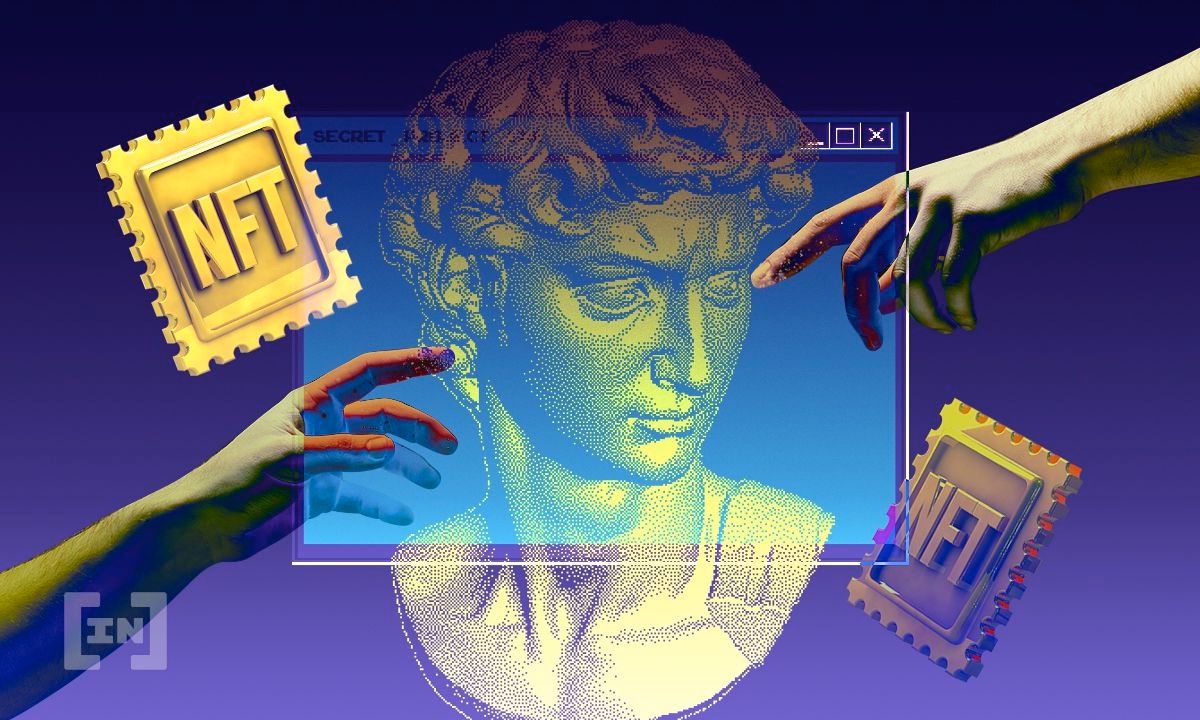
Non-Fungible Token (NFT) Security
13 Oct 2022

13 Oct 2022
Gridlock cryptocurrency wallet utilizes threshold signatures and social verification to offer the best security in the Web3 wallet industry.
Download Gridlock for Android or iOS today.
The world of blockchain technology and digital assets is constantly evolving, and new technologies seem to emerge continuously — one of the latest trends is the use of non-fungible tokens or NFTs by a large number of users across the world.
NFTs have become popular recently, with a growing number of people and businesses using them for various purposes. From games and collectibles to art and digital assets, NFTs are being used in an ever-increasing number of ways.
They're not without any vulnerability, though. Are NFTs safe? NFT marketplaces have sprung up, and mainstream browsers make browser extensions available to access blockchains and crypto assets and even to monitor and trade in accounts on a transaction basis, including buying NFTs.
In addition, cryptocurrency wallets have incorporated support for NFTs enabling users to receive, send, view, and store them.
NFTs first occurred on the Ethereum blockchain and are now widely available across several blockchains. The concept is much older though, according to some early cybersecurity enthusiasts, hackers, and cypherpunks who conceived of the notion decades earlier.
NFTs are unique digital identifiers that cannot be copied, substituted, or subdivided, and they are recorded on a blockchain, which certifies authenticity and ownership. NFTs can reference data on and off the blockchain, enabling them to contain images and other data that make them useful.

Also known as non-fungible tokens, an NFT is a unique digital asset stored on a blockchain. Unlike traditional cryptocurrencies, for example, wherein the tokens are fungible and interchangeable and can be used to purchase goods and services, traded, or sold, NFTs are unique in that their issuance and identity on the blockchain are persistent and cryptographically verifiable as unique. Access to buy, sell or otherwise trade them is reserved for users who possess the private keys or seed phrases.
For several years, NFT projects have raised millions of dollars from users by selling digital art, collectibles, and other digital assets. So what exactly are NFTs, and why are people so interested in them?
People can sell NFTs for millions, paying only mere dollars in transactional fees. Their immutable nature, coupled with the security of multi-factor authentication and a seed phrase, renders token transactions and cryptocurrency transactions explicitly and redundantly secure in the blockchain as it carries forward into the future, securly distributed among many computers.
The NFT boom in projects has been driven by the launch of new crypto wallets that make it easy to buy and sell, making NFT ownership simple and NFT trading convenient. In addition, smart contracts have made it possible to conduct NFT sales and transfers without needing a third-party intermediary. As a result, NFTs have emerged as a powerful new way to monetize digital content.
So why have NFTs become so popular? For many people, they offer a more convenient and secure way to own and trade digital assets. In addition, NFTs provide a way to support creative projects and artists directly. As the NFT market grows, we expect to see even more innovative uses for these unique tokens.
Security is always a top concern regarding a scarce and unique digital asset like an NFT. Due to the rapidly rising value of certain NFTs, much attention has come to the space. Even though NFTs are still relatively new in technology, there have already been several high-profile incidents of NFT theft.
As the value of NFTs continues to rise, we will likely see even more cases of theft and fraud. So, if you have security concerns concerning access to your crypto wallet, here is the answer to protecting your NFTs from theft or loss.
The first step is researching and choosing a secure storage platform. Several options are available, so do your research to find one that meets your needs. Many utilize cutting-edge technologies, from hardware wallets to a VPN service. It would help if you also cared to keep your private keys safe and secure.

Using two-factor authentication drastically reduces vulnerability for your NFT wallet. It is a critical step if you want to protect your wallet and keep your NFTs safe from the ability of a hacker to steal. Remember, when you purchase a digital asset, it lives on the blockchain, and you maintain access to it and can delegate that value. Thinking of it this way can help you avoid vulnerabilities in the blockchain industry and excessive risks and improve your understanding of how safe user value is.
You are the only one responsible for protecting your NFTs, tokens, and cryptocurrencies. Don't let anyone else take control of your digital assets or wallet. Accepting these precautions can help ensure you're well-versed in NFT security.
Consider two-factor protection as part of your overall security strategy. Two-factor authentication makes it orders-of-magnitude more difficult for your crypto to be stolen. There are several robust 2FA apps available in the marketplace today.
There are many ways to compromise your digital assets. Phishing scams, malicious code, malicious actors, or, for example, a hacker who can steal a user's account holding tokens or NFTs, or even something as simple as sending tokens to centralized platforms that utilize hot wallets and or have loose security protocols, are all methods with vulnerabilities.
Do your own research! When you buy NFTs, tokens, or digital works, check the minting number and other details. To check for a sound investment, dig deeper by checking the IPFS node (Interplanetary File System) if applicable, the hardware wallet compatibility if applicable, and by understanding the asset you're buying, whether it's an NFT or a token or digital art, et. al.

We have all heard the adage "measure twice, cut once" and understand that the material cannot join back together after the cut is made. The same applies to sending a crypto transfer. When you make an NFT transaction, check that the information is entered correctly twice before proceeding.
There are a lot of NFT scams out there, and in recent years, cybersecurity has been at the forefront, and it seems that cryptocurrency is the new hotbed for an attacker to steal value.
NFT smart contracts are agreements stored on a blockchain accessible through an internet connection and can be used to trade crypto assets like Bitcoin and Ethereum. Often, a smart contract is what controls the creation (minting) of an NFT and can also determine infinite other ways in which interactions with non-fungible tokens can take place.
Unlike a traditional contract, a smart contract for an NFT can execute without the possibility of intervention as long as the blockchain is up. An NFT is immutable and cannot be changed or deleted, decreasing security risks. This makes both NFTs and smart contracts more secure and trustworthy for users.
There are some security risks associated with smart contracts, such as NFTs. For example, if you lose your private keys, you will not be able to access your NFTs. Additionally, NFTs can be stolen if you do not take proper security precautions when storing them in a crypto wallet. Nonetheless, a smart contract can offer many benefits for users, including enhanced security and trustworthiness, that make them a valuable tool for trading NFT assets and estimating NFT value without total reliance on a centralized accounts-based model.
Smart contracts are also used in the creation of NFTs across a number of blockchains. As an important security measure, it is crucial to ensure you are interacting with the correct contract and that it is legitimate.
An attacker can create a contract similar to the real contract you want to use. This creates the requirement of checking to make sure it is the correct contract, or else your digital assets could be at risk.
Here are some best practices for storing NFTs and securing them in a crypto wallet.
First and foremost, do your research. Not all NFTs are created equal, and some platforms are more vulnerable to attack than others. Be sure to read up on the security measures of the platform you're using and only purchase NFT assets from trusted sources to ensure you don't lose access.
Second, don't store your NFTs on a centralized exchange. These exchanges are often targets for hackers because the assets are usually kept in a hot wallet, making them easier to steal. And you may have little recourse if your NFTs are stolen. Instead, store your NFTs in wallets with greater security, such as a hardware wallet or a software wallet with distributed keys. This makes it much more difficult for an attacker to steal NFTs from a user.
The fundamental problem when interacting with centralized exchanges is that they provide users with a username and password and do not provide wallet addresses (except for deposit addresses). This means if there is a problem with the exchange's servers, you have only a username that is useless anywhere else but on their now incapacitated or defunct servers.

In addition, employees of centralized exchanges are trusted with managing these hot wallets and conducting the transfers and accounting required to run a smooth operation. Typically, this goes well until there is either a nefarious actor or extremely high traffic, which usually causes something to break.
Overall, NFTs offer many benefits, including 24/7 trading, safety, and the ability to support creative projects. However, it's important to remember that NFTs are still a new and evolving technology. As such, they come with inherent risks and vulnerabilities. Be sure to do your research and monitor your NFTs closely to help protect them from theft and scams. Proper care makes NFTs a valuable addition to your digital asset portfolio.
If you already have NFTs, what can you do to protect yourself better? If you're thinking about buying NFTs, do you have a plan to store them safely? Check out gridlock.network to download the most secure crypto wallet for storing your NFTs and cryptocurrency.
- - -
Written by Mason Winsed

Mason Winsed simplifies blockchain for the people. With a comp-sci background and a passion for crypto safety, he's your go-to for straight-forward crypto wisdom. In his off time, he's coding or gaming. Join Mason for a no-nonsense crypto talk.